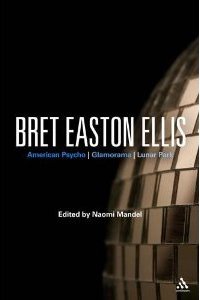Dr. Alex E. Blazer
Department of English
Georgia College & State University
Milledgeville, GA 31061
"American Psycho, Hamlet, and Existential Psychosis"
Bret Easton Ellis: American Psycho, Glamorama, and Lunar Park.
Ed. Naomi Mandel. London: Continuum, 2011. 36-49.

In the photograph of my father he's wearing a six-button double-breasted black sport coat, a white spread-collar cotton shirt, a tie, pocket square, shoes, all by Brooks Brothers. He's standing next to one of the topiary animals a long time ago at his father's estate in Connecticut and there's something the matter with his eyes.
(Bret Easton Ellis, American Psycho 366)
Speak; I am bound to hear.
(William Shakespeare, Hamlet I.5.6)
After the encounter, the collision, with the unassimilable signifier, it has to be reconstituted, since this father cannot be simply a father, a rounded-out father, the ring of just before, the father who is the father for everybody.
(Jacques Lacan, Seminar III: The Psychoses 321)
This article examines the problem of the absent father as existential catalyst and psychotic trigger in Bret Easton Ellis's American Psycho through two interrelated lenses, the tragic relationship between ghostly fathers and melancholic sons in William Shakespeare's Hamlet and the theoretical relationship between symbolic fathers and psychotic sons in Jacques Lacan's psychoanalytic conceptualization of psychosis.
The explicit father/son relationships in Lunar Park─the paternal haunting, the identification of Patrick Bateman with Ellis's father, and Ellis's vanished son─along with the symbolic location names─Elsinore Lane, Ophelia Boulevard, Claudius Street─and epigraph from Hamlet encourage readers to retroactively interpret American Psycho's Patrick Bateman in terms of Shakespeare's Hamlet. Just as Hamlet is a play about a son who, being bound by his dead father to avenge his murder, finds himself paradoxically adrift in the confusing, contradictory world, American Psycho can be read as novel about an emotionally abandoned son adrift and searching for meaning and trying to fit into a world his father never explained or bound him to. "To be or not to be: constitutes the fundamental existential question for both characters. While Hamlet's answer takes him down the path of tragic melancholy, Bateman's leads to psychic dissolution.
Jacques Lacan asserts that psychosis stems from a foreclosure upon reality due to a lack of paternal prohibition and symbolic castration; one's meaningful grasp of the world is directly proportional to his symbolic understanding. Because Bateman is alienated from his father who is not present to set boundaries and teach him his place in the world (in the novel, the elder Bateman is only portrayed in a photograph and uses his accountants to father his sons), he floats adrift in a solipsistic sea of narcissism until he latches onto status symbols of power and enjoyment to anchor his psyche. While Hamlet is bound, albeit resistant, to his father's moral imperative, Bateman's absent paternal function offers no moral center. Consequently, Hamlet's monologues drive him to an understanding of existence based on tragic loss and Bateman's interiority circles an innate emptiness. Still unable to fill his boundless need for symbolic stability because those signifiers are constantly fluctuating around a void, his fragmented psyche descends into a violent, self-destructive delusion. Since neither people nor objects afford certainty of his being in the world, Bateman becomes the all powerful destroyer of the world, at least in his own mind.
Finally, the article examines the larger cultural implications of the novel. Is Patrick Bateman a postmodern Hamlet on a quest to climb out of the existential chasm opened by the dissolution of family ties and the ever-presence of name-brand goods? Does Bateman represent a self-destructive postmodern condition in which the disintegration of the paternal function's integration of psyche into the symbolic world generates an aggressive, unhinged narcissism that knows no bounds and careens the culture toward psychosis?
This abstract summarizes my forthcoming article, "American Psycho, Hamlet, and Existential Psychosis." Bret Easton Ellis: American Psycho, Glamorama, and Lunar Park. Ed. Naomi Mandel. London: Continuum, 2011. 36-49.